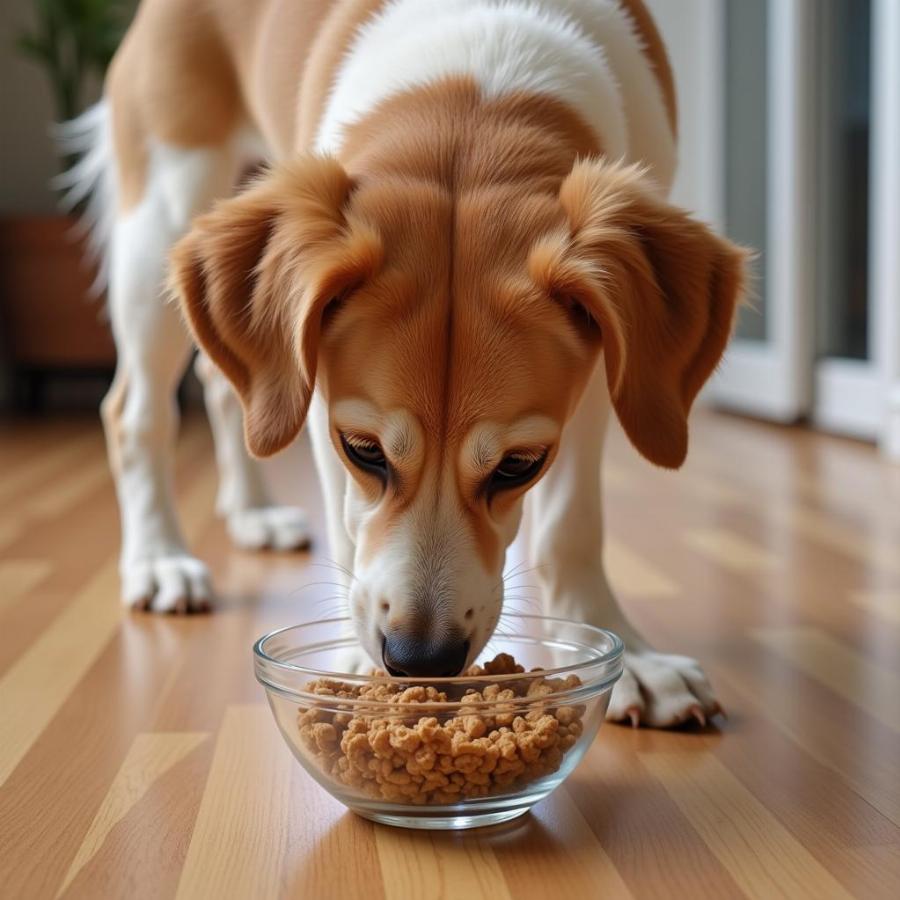Kibble is a staple in many canine diets, but what happens when your dog suddenly turns their nose up at their once-loved food? This can be a frustrating experience, leaving owners worried about their furry friend’s health and well-being. This article will delve into the reasons why your dog won’t eat kibble, offer solutions, and help you navigate this common issue.
Why is My Dog Suddenly Refusing Kibble?
There are a multitude of reasons why your canine companion might be refusing their kibble. It could be a simple matter of picky eating, or it could signal a more serious underlying health issue. Understanding the potential causes is the first step toward finding a solution. Is it the kibble itself? Has their routine changed? Are they feeling under the weather? Let’s explore some possibilities.
Medical Reasons for Kibble Aversion
Sometimes, a dog’s refusal to eat kibble can stem from an underlying medical condition. Dental problems, such as a cracked tooth or gum inflammation, can make chewing painful. Gastrointestinal issues, like an upset stomach or food allergies, can also contribute to a loss of appetite. Even something seemingly unrelated, like an ear infection, can impact their desire to eat.
Behavioral Reasons for Kibble Refusal
Behavioral factors can also play a significant role in a dog’s kibble aversion. Have you recently switched brands or flavors? Perhaps they’re bored with the same old food. Spoiling them with too many treats can also decrease their appetite for kibble. Even changes in their environment, like a new house or a new family member, can lead to stress and changes in eating habits.
What to Do When Your Dog Won’t Eat Kibble
Now that we’ve identified some potential reasons for your dog’s kibble aversion, let’s explore some solutions. Remember, if you suspect a medical issue, it’s crucial to consult with your veterinarian.
Addressing Medical Concerns
A thorough checkup with your vet is the first step if you suspect a medical reason for your dog’s refusal to eat. They can diagnose any underlying health problems and offer appropriate treatment. This might involve dental care, medication for gastrointestinal issues, or other interventions.
Tackling Behavioral Issues
If your vet rules out medical issues, you can focus on behavioral strategies. Try switching to a different kibble brand or flavor. You can also try adding warm water or low-sodium broth to make the kibble more enticing. Make mealtimes a positive experience, free from distractions. Establishing a consistent feeding schedule and avoiding free-feeding can also help.
 Dog trying new food
Dog trying new food
Tips and Tricks to Encourage Kibble Consumption
Here are some additional tips to encourage your picky eater to enjoy their kibble:
- Introduce new kibble gradually: Mix the new kibble with the old one, slowly increasing the ratio of new to old.
- Hand-feeding (in moderation): Hand-feeding a few pieces of kibble can create a positive association with the food. However, avoid overdoing it, as this can lead to further pickiness.
- Food puzzles and toys: These can make mealtimes more engaging and stimulating, especially for bored eaters.
- Exercise before meals: A good workout can stimulate their appetite.
When to Seek Veterinary Help
If your dog’s refusal to eat kibble persists for more than 24 hours, or if they are exhibiting other symptoms like lethargy, vomiting, or diarrhea, it’s crucial to consult your veterinarian immediately.
Conclusion
Dealing with a dog that won’t eat kibble can be challenging, but with patience and the right approach, you can help your furry friend regain their appetite. By understanding the potential causes and implementing the strategies outlined in this article, you can address the issue effectively. Remember, consulting with your veterinarian is essential if you suspect a medical reason for your dog’s food aversion. A healthy appetite is a key indicator of overall well-being, so don’t hesitate to seek professional guidance when needed.
FAQ
- What if my dog only eats treats and not kibble? Limit treats to avoid spoiling their appetite for kibble.
- Can I add human food to my dog’s kibble? Some human foods are safe for dogs, but consult your vet before making any dietary changes.
- How long can a dog go without eating kibble? If your dog refuses to eat kibble for more than 24 hours, contact your veterinarian.
- Is it okay to switch kibble brands frequently? Frequent switching can lead to digestive upset, so it’s best to stick to one brand unless recommended otherwise by your vet.
- Should I warm up my dog’s kibble? Warming the kibble can enhance its aroma and make it more palatable for some dogs.
Beaut Dogs is your one-stop shop for all things related to dog care. We offer expert advice, helpful tips, and a wealth of information to help you navigate the wonderful world of dog ownership. For further assistance or personalized advice, please don’t hesitate to contact us via Email at [email protected]. Beaut Dogs is committed to providing you with the resources you need to ensure your canine companion thrives. Visit us at https://beautdogs.com.